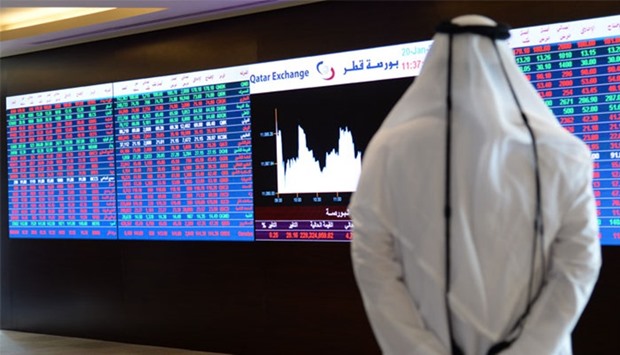Ex-dividend woes and Standard and Poor’s (S&P) ‘negative’ outlook on the country’s credit ratings hit the Qatar Stock Exchange (QSE), whose key index plunged 253 points and capitalisation eroded QR14bn this week.
Heavy selling — especially within telecom, transport and real estate — led the 20-stock Qatar Index plummet 2.37% this week, which saw the QSE stipulate at least 80% trading days and a minimum 5% annualised velocity for constituents during the final quarter of the 12-month review period.
Abu Dhabi plunged 3.03%, Dubai (1.77%), Saudi Arabia (1.42%), Kuwait (0.83%), Muscat (0.4%) and Bahrain (0.27%) this week which saw Barwa Real Estate Company exploring investment opportunities to ensure profitable revenues.
The QSE’s year-to-date gains were at mere 0.29% against 16.75% in Kuwait, 9.62% in Bahrain and 0.16% in Muscat; whereas Saudi Arabia declined 4.07%, Abu Dhabi (1.96%) and Dubai (0.3%).
Mid and microcap equities suffered heavy sell-off this week which witnessed S&P affirm Qatar's long term rating at 'AA' and short term at 'A-1+' but outlook revised down to ‘negative’ from ‘stable’.
Islamic stocks fell slower than the main index and other indices this week which saw S&P expecting Qatar Petroleum to remain profitable.
Foreign institutions hurriedly squared off their positions this week which saw Qatar First Bank (QFB) sell a partial stake in one of the most successful leading healthcare platforms in Abu Dhabi, Dubai, Sharjah and Kuwait.
Nevertheless, selling pressure from local retail investors and domestic institutions weakened and there was lower buying support from non-Qatari individuals this week which saw Doha Bank shareholders’ approve 20% rights issue through which it is planning to raise as much as QR1.3bn.
Overall trade turnover and volumes shrank this week which saw banking, real estate and telecom sectors together account for about 73% of the volumes.
In volumes, banks and financial services constituted 35% of the total, realty (23%), telecom (14%), industrials (11%), consumer goods and insurance (6% each), and transport (5%) this week which saw Qatar Re, a reinsurance arm of Qatar Insurance Company, register 14 times oversubscription to its $450mn Tier 2 notes.
In value, banks and financial services’ share was 39%, real estate (15%), industrials (14%), consumer goods (13%), insurance (7%), telecom (6%) and transport (4%) this week which witnessed the Gulf Investment Group, a brokerage firm, launch a demo trading account for the shares listed on the QSE.
Opening the week weak at 10,623 points, the market fell faster for the next two days to hit a 10-week low of 10,361 points, mainly on ex-dividend woes of certain stocks and S&P downgrade. Despite last day’s buying support, the index overall settled lower at 10,467 points this week which saw Barwa dominate the trading in volumes and value.
The 20-stock Total Return Index shrank 1.74%, All Share Index (comprising wider constituents) by 1.5% and Al Rayan Islamic Index by 0.86% this week which saw no trading in treasury bills and government bonds.
The telecom index plummeted 6.52%, transport (4.83%), realty (2.31%), industrials (0.96%), consumer goods and insurance (0.78% each), and banks and financial services (0.53%).
Market capitalisation eroded 2.37% to QR563.52bn as mid, micro, large and small cap equities melted 3.99%, 2.51%, 2.02% and 1.18% respectively this week.
Small and microcap scrips have gained 3.36% and 1.22% year-to-date; while mid and large caps declined 4.25% and 0.04% respectively.
More than 77% of the stocks were in the red with major losers being Doha Bank, Barwa, Qatar Industrial Manufacturing, Ooredoo, Qatar National Cement, Woqod, Qatar Electricity and Water, Vodafone Qatar, Gulf Warehousing, Nakilat, Milaha, QFB and Salam International Investment.
Nevertheless, Qatar General Insurance and Reinsurance, Qatari Investors Group, Alijarah Holding, Medicare Group, Islamic Holding Group, Dlala and Widam Food were among the gainers.
Foreign institutions were net sellers to the tune of QR23.15mn against net buyers of QR103.86mn the week ended March 2.
However, local retail investors’ net selling plunged to QR5.33mn compared to QR138mn the previous week.
Domestic institutions’ net profit booking also weakened to QR25.91mn against QR64.46mn the week ended March 2.
Non-Qatari individual investors’ net buying declined to QR54.39mn compared to QR98.6mn the previous week.
Total trade volume fell 17% to 50.95mn shares, value by 23% to QR1.84bn and transactions by 18% to 20,896 this week.
There was 48% plunge in the insurance sector’s trade volume to 2.86mn equities, 53% in value to QR134.52mn and 51% in deals to 407.
The industrials sector’s trade volume plummeted 41% to 5.49mn stocks, value by 44% to QR264.2mn and transactions by 39% to 3,761.
The real estate sector saw 18% shrinkage in trade volume to 11.75mn shares, 22% in value to QR278.93mn and 31% in deals to 3,025.
The consumer goods sector’s trade volume tanked 13% to 3.04mn equities and value by 4% to QR244.98mn, while transactions gained 12% to 3,354.
The market witnessed 8% decline in the telecom sector’s trade volume to 7.36mn stocks and 20% in value to QR116.59mn but on 18% expansion in deals to 1,286.
The banks and financial services sector’s trade volume was down 3% to 18.03mn shares, value by 10% to QR721.97mn and transactions by 9% to 7,604.
However, the transport sector reported 11% increase in trade volume to 2.42mn equities but on 1% fall in value to QR76.33mn and 18% in deals to 1,459.
Abu Dhabi plunged 3.03%, Dubai (1.77%), Saudi Arabia (1.42%), Kuwait (0.83%), Muscat (0.4%) and Bahrain (0.27%) this week which saw Barwa Real Estate Company exploring investment opportunities to ensure profitable revenues.
The QSE’s year-to-date gains were at mere 0.29% against 16.75% in Kuwait, 9.62% in Bahrain and 0.16% in Muscat; whereas Saudi Arabia declined 4.07%, Abu Dhabi (1.96%) and Dubai (0.3%).
Mid and microcap equities suffered heavy sell-off this week which witnessed S&P affirm Qatar's long term rating at 'AA' and short term at 'A-1+' but outlook revised down to ‘negative’ from ‘stable’.
Islamic stocks fell slower than the main index and other indices this week which saw S&P expecting Qatar Petroleum to remain profitable.
Foreign institutions hurriedly squared off their positions this week which saw Qatar First Bank (QFB) sell a partial stake in one of the most successful leading healthcare platforms in Abu Dhabi, Dubai, Sharjah and Kuwait.
Nevertheless, selling pressure from local retail investors and domestic institutions weakened and there was lower buying support from non-Qatari individuals this week which saw Doha Bank shareholders’ approve 20% rights issue through which it is planning to raise as much as QR1.3bn.
Overall trade turnover and volumes shrank this week which saw banking, real estate and telecom sectors together account for about 73% of the volumes.
In volumes, banks and financial services constituted 35% of the total, realty (23%), telecom (14%), industrials (11%), consumer goods and insurance (6% each), and transport (5%) this week which saw Qatar Re, a reinsurance arm of Qatar Insurance Company, register 14 times oversubscription to its $450mn Tier 2 notes.
In value, banks and financial services’ share was 39%, real estate (15%), industrials (14%), consumer goods (13%), insurance (7%), telecom (6%) and transport (4%) this week which witnessed the Gulf Investment Group, a brokerage firm, launch a demo trading account for the shares listed on the QSE.
Opening the week weak at 10,623 points, the market fell faster for the next two days to hit a 10-week low of 10,361 points, mainly on ex-dividend woes of certain stocks and S&P downgrade. Despite last day’s buying support, the index overall settled lower at 10,467 points this week which saw Barwa dominate the trading in volumes and value.
The 20-stock Total Return Index shrank 1.74%, All Share Index (comprising wider constituents) by 1.5% and Al Rayan Islamic Index by 0.86% this week which saw no trading in treasury bills and government bonds.
The telecom index plummeted 6.52%, transport (4.83%), realty (2.31%), industrials (0.96%), consumer goods and insurance (0.78% each), and banks and financial services (0.53%).
Market capitalisation eroded 2.37% to QR563.52bn as mid, micro, large and small cap equities melted 3.99%, 2.51%, 2.02% and 1.18% respectively this week.
Small and microcap scrips have gained 3.36% and 1.22% year-to-date; while mid and large caps declined 4.25% and 0.04% respectively.
More than 77% of the stocks were in the red with major losers being Doha Bank, Barwa, Qatar Industrial Manufacturing, Ooredoo, Qatar National Cement, Woqod, Qatar Electricity and Water, Vodafone Qatar, Gulf Warehousing, Nakilat, Milaha, QFB and Salam International Investment.
Nevertheless, Qatar General Insurance and Reinsurance, Qatari Investors Group, Alijarah Holding, Medicare Group, Islamic Holding Group, Dlala and Widam Food were among the gainers.
Foreign institutions were net sellers to the tune of QR23.15mn against net buyers of QR103.86mn the week ended March 2.
However, local retail investors’ net selling plunged to QR5.33mn compared to QR138mn the previous week.
Domestic institutions’ net profit booking also weakened to QR25.91mn against QR64.46mn the week ended March 2.
Non-Qatari individual investors’ net buying declined to QR54.39mn compared to QR98.6mn the previous week.
Total trade volume fell 17% to 50.95mn shares, value by 23% to QR1.84bn and transactions by 18% to 20,896 this week.
There was 48% plunge in the insurance sector’s trade volume to 2.86mn equities, 53% in value to QR134.52mn and 51% in deals to 407.
The industrials sector’s trade volume plummeted 41% to 5.49mn stocks, value by 44% to QR264.2mn and transactions by 39% to 3,761.
The real estate sector saw 18% shrinkage in trade volume to 11.75mn shares, 22% in value to QR278.93mn and 31% in deals to 3,025.
The consumer goods sector’s trade volume tanked 13% to 3.04mn equities and value by 4% to QR244.98mn, while transactions gained 12% to 3,354.
The market witnessed 8% decline in the telecom sector’s trade volume to 7.36mn stocks and 20% in value to QR116.59mn but on 18% expansion in deals to 1,286.
The banks and financial services sector’s trade volume was down 3% to 18.03mn shares, value by 10% to QR721.97mn and transactions by 9% to 7,604.
However, the transport sector reported 11% increase in trade volume to 2.42mn equities but on 1% fall in value to QR76.33mn and 18% in deals to 1,459.


